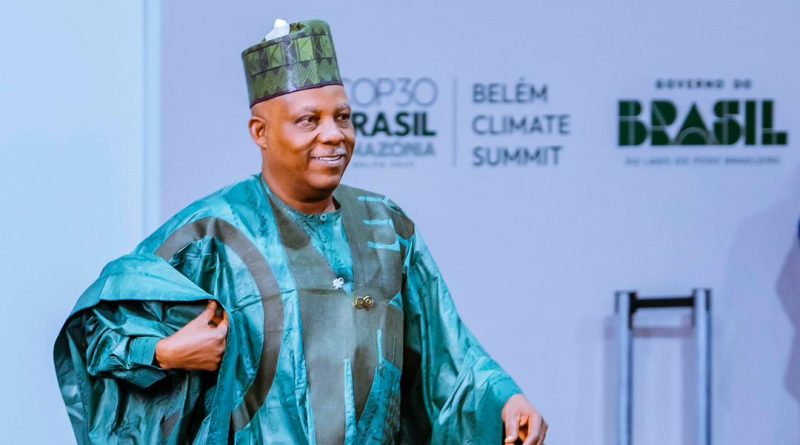Nigeria demands boost in global financing to restore, protect nature
Nigeria has implored the international community to significantly increase global financing to protect and restore nature’s economic value through predictable, equitable, and accessible funding mechanisms.
According to Nigerian Vice President Kashim Shettima, since forests, landscapes, and oceans are shared resources that are outside the jurisdiction of any single nation, their protection requires global solidarity.
Mr Shettima stated Nigeria’s position in Belem, Brazil, where he represented President Bola Tinubu at a high-level thematic session titled “Climate and Nature: Forests and Oceans,” on the margins of the ongoing United Nations Climate Change Conference (COP 30) being held in that South American country.
The VP regretted that while nature is probably the most critical infrastructure in the world, it has long been treated as a commodity to exploit rather than an asset to invest in, even as he said Nigeria is solidly driven by this knowledge “to integrate nature-positive investments into” its climate finance architecture.
“Through our National Carbon Market Framework and Climate Change Fund, we aim to mobilise up to three billion US dollars annually in climate finance. These resources will be reinvested in community-led reforestation, blue carbon projects, and sustainable agriculture.
“We call on our global partners to recognise the economic value of nature and to channel significant finance towards protecting and restoring it through predictable, equitable, and accessible funding mechanisms,” he declared.

Mr Shettima contended that the Global South countries that “have contributed least to this crisis, are today paying its highest price,” insisting that for climate justice to be seen as well served, nations that have benefited more “from centuries of extraction must now lead in restoration.”
Accordingly, he called on the global community to increase grant-based finance, operationalise Blue Carbon Markets, and implement debt-for-nature swaps to enable developing countries to invest in conservation.
“We urge the international community to scale up grant-based finance for nature-based solutions, implement debt-for-nature swaps that free developing countries to invest in conservation, operationalise Blue Carbon Markets under Article 6 of the Paris Agreement, and strengthen community-led governance so that indigenous peoples, farmers, and fisherfolk are rewarded for their stewardship rather than displaced by it,” he stated.
The Nigerian Vice President said countries that took their forests and oceans for granted had always paid dearly for it, noting that it is the reason why Nigeria will boldly “sit in the front row of any global forum where these twin determinants of ecological order are being discussed.
“We, too, are under siege. We see the signs of danger in deforestation, desertification, illegal mining, coastal erosion, and rising sea levels within our borders. The Sahara advances by nearly one kilometre each year, displacing communities and eroding livelihoods. Each piece of land these threats overcome invites conflict into human lives, compounding our development challenges,” he maintained.
VP Shettima told world leaders and other participants at the high-level session that while Nigeria’s Climate Change Act 2021 enshrines nature-based solutions as a legal obligation of the state, the nation is “taking bold, coordinated steps to restore balance between climate, nature, and development.”
He continued: “Our National Council on Climate Change provides the institutional backbone for integrating climate action into all sectors of governance. We are implementing the Great Green Wall Initiative, reforesting degraded lands across eleven frontline states, planting over ten million trees and creating thousands of green jobs for our youth and women.
“Through our National Afforestation Programme and Forest Landscape Restoration Plan, we aim to restore more than two million hectares of degraded land by 2030. We have also launched our Marine and Blue Economy Policy to harness the vast potential of our seas sustainably — promoting climate-smart fisheries, coastal protection, and marine biodiversity conservation.”
Mr Shettima reaffirmed Nigeria’s commitment to working with partners across the globe to “advance a global agenda where climate action becomes synonymous with nature restoration and human prosperity.”
READ ALSO: Shettima arrives in Brazil for COP 30
He vehemently rejected the “portrayal of Africa as a mere victim of climate change,” arguing that it “is an outdated narrative” about a continent that is also a source of its solutions.
The Nigerian Vice President listed Africa’s rainforests, mangroves, peatlands, and oceans as some of the planet’s largest untapped carbon sinks, saying young people in the continent are also “the world’s greatest untapped source of innovation and resolve.
“Nigeria believes that COP30 must mark the beginning of a new compact — one that recognises Africa’s ecosystems as global assets deserving of global investment and protection. We invite all partners to join Nigeria and the African Union in advancing the African Nature Finance Framework, designed to unlock private capital for reforestation, ecosystem restoration, and blue economy development across the continent,” he added.
Stanley Nkwocha
Senior Special Assistant to The President on Media & Communications
(Office of The Vice President)
7th November


